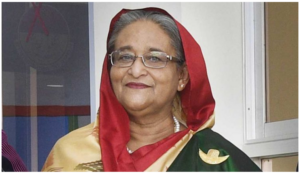Like every other leader, Hasina has also been careful not to allow political aspirations from within her ruling Awami League to blossom beyond a point.
“The significance of India’s ties with Bangladesh lies in its centrality for India’s ‘Neighbourhood First’ policy and Dhaka’s growing relevance for India’s ‘Act East’ Policy,” Jaishankar said. Reciprocating the sentiments, Minister Momen said the two countries have committed to continue to work together to take “our bilateral relations to newer heights under the leadership of Prime Minister Narendra Modi and Prime Minister Sheikh Hasina”.
Therein lies the crux of the bilateral relations and hidden issues therein. After a break when bete noire Begum Khaleda Zia was prime minister, Sheikh Hasina has been in office through three rounds of parliamentary polls since January 2009 and has helmed Bangladesh’s economic recovery; it is now among the fastest growing nations in South Asia and the world. She has also successfully managed her government’s ties with China through the BRI and the US through Indo-Pacific.
Untested waters: Bilateral relations between the two countries improved vastly under the previous Manmohan Singh government. Ties have stabilised and moved further forward under Modi. The change of government in Delhi did not really impact bilateral relations, and rather further strengthened and expanded the same. Dhaka’s hurt over the CAA issue and anti-CAA protests in India too have mostly been forgotten. Bangladesh has been the single largest beneficiary of India’s ‘Vaccine Diplomacy’.
The same cannot be said about Bangladesh, particularly after the continuing years of political stability, economic growth and focused foreign policy. While Hasina is still relatively young at 73, the inevitability of anti-incumbency, which is an attendant curse of democracy, cannot be overlooked, later if not sooner.
Like every other leader, Hasina has also been careful not to allow political aspirations from within her ruling Awami League to blossom beyond a point. She has decimated the political opposition, identified with one-time rival Khaleda’s Bangladesh Nationalist Party (BNP) on the one hand, and the latter’s fundamentalist/extremist ally, Jamaat-e-Islami, on the other.
Through the delayed employment of ‘transitional justice’ for the mindless massacre of fellow citizens during the nation’s ‘Independence War’ in 1971, Hasina has ensured the near decimation of the Jamaat. Through more civil and criminal proceedings, Khaleda’s political voice and electoral chances have been put down, almost for good. If there is a hidden third face, even its shadows are not visible.
After Hasina, who?: Today, Bangladeshis should be asking this question. New Delhi should be asking the question even more—to itself. However, India seems to be satisfied with what is in sight, and also seems to wait for things to happen as and when they do in Bangladesh—something like the recent military coup in Myanmar.
Because of comparative sizes—of the nations, populations and economies, among others—India is in the unenviable position of all the time second-guessing every neighbour, especially in terms of its domestic politics. Eternal optimism, especially in terms of bilateral relations, is what Modi’s ‘Neighbourhood Policy’ is based upon. From Nehru’s days, it has been an Indian concept. It is not always shared by individual neighbours, especially so through changing regimes.
Foreign policy today covers trade and security policies, too. They are often influenced by domestic politics and electoral commitments. India is an exception. Though Modi’s BJP-RSS parivar has been repeatedly taunting the Nehru-Gandhi legacy of the nation’s security policy, the more they promise to change it, the more it has remained the same. They have tweaked only those aspects that are germane to their domestic politics, not otherwise.
This is not the case with India’s neighbours. For instance, Bangladesh’s relations with India became a victim of the Hasina-Khaleda war of attrition-cum-succession. The unsure nature of the nation’s democracy after the assassination of ‘Bangabandhu’ Mujibur Rahman, Hasina’s father, unsettled ties with India earlier.
Today, the nation, once again, may be inching towards a precipice, millimetre by millimetre, in the absence of a predictable line of succession and an even more strong opposition, for the future to take care of itself. New Delhi should begin crystal-gazing, if it is not doing it already, if it is not to be left groping in what at present is the darkness of domestic politics in Bangladesh.
Given India’s continued ‘comfort level’ with the 30 long years of Maumoon Gayoom’s leadership, New Delhi needed time to readjust to the new realities in Maldives (also in the neighbourhood), when new-generation voters in that country decided to go in for ‘democratic transition’ when given the chance in 2008. In the fast-tracked global/regional scenario, India may not now have as much time in the case of Bangladesh, if and when it came to that.
(The writer is Distinguished Fellow & Head-Chennai Initiative, Observer Research Foundation. sathiyam54@

